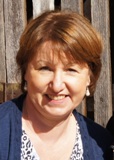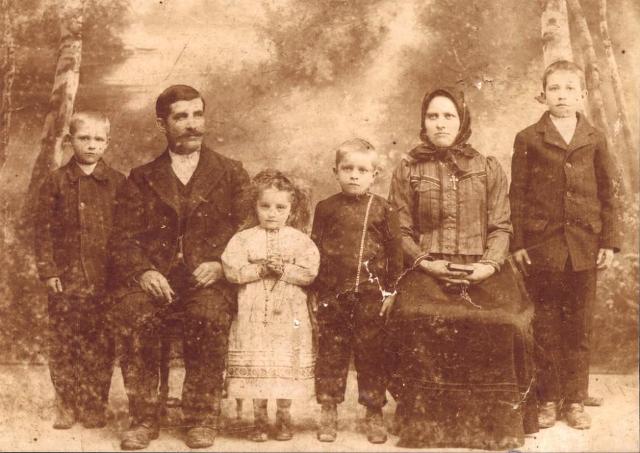Our Trip to Zarev Brod (2003)

By Maria Kasmannshuber
Translated by Rose Vetter, 25 May 2013
My father, Jakob Märzluft (1909-1994), was born in Endsche, later renamed Zarev Brod. Upon his retirement after a very busy life, he finally had the time to travel to his hometown of Temerin in the Batschka. He also visited his maternal relatives in Fedyvernek and Szolnok, Hungary. Reconnecting with his relatives kindled in him a greater interest for his ancestors and led to further research.
When he found out that our Märzluft clan had originated in the community of Kittersburg-Goldscheuer-Marlen, now part of the city of Kehl (across the Rhine from Straßburg), my father was determined to take a trip there. My husband and I helped him fulfill his wish, and it turned out to be a very memorable day for him. However, we discovered that the Märzluft name was not known there; instead, the name Marzluf is quite common and is the root of our family name. Subsequent to the emigration to Hungary, the name evolved into different variants, such as Marzluft, Merzluft, Merczluft.
This visit to our ancestral home also aroused my own interest in my family’s history. I started making notes on our old pictures, asked more specific questions about the relatives and loved to listen to stories about “Daham”.
|
My grandfather, Georg Märzluft, (born in Temerin) had settled in Endsche with several siblings around 1900. As his father, Mathias (born in Parabutsch), who was earning his living by trading agricultural equipment, had travelled quite frequently and had heard that there was cheap land available in Bulgaria; it came about that part of our family migrated to Endsche. In 1904, my grandfather married Rosalia Göbel, who was born in Fedyvernek, Hungary. Father Franz Krings celebrated the marriage, and the witnesses were Lorenz Hiller and Michael Vecsey. Georg and Rosalia had five children: Mathias, Georg+, Jakob, Georg and Elisabeth. My Göbel grandmother’s sister Elisabeth married Martin Gruber (later magyarized to “Gabor”). His sister
|
|

Maria
Kasmannshuber's Grandparents,
Georg Märzluft & Rosalia Göbel & their children. Jakob, is on the left. Taken in Bulgaria. |
|
Maria, who married Franz Bauer, died in 1905, a year after the birth of her daughter Anna. Another sister, Magdalena, married Franz Zerr (born Mannheim, Russia) in 1908 in Kalfa/Ali Anife/Germanzi, a Bulgarian village founded by Russia Germans in 1903. This marriage probably came about because Father Krings’ ministry during the first few years also included this village. |
When the men were conscripted into military service in World War I, life became very difficult for the women. In 1918, at the end of the war, many families had to leave Endsche, returning to the home villages of the men. Many families must have returned to Endsche in 1920, but were deported in 1943 as part of the “Heim ins Reich” initiative. My family decided not to return to Endsche, but did go back once in order to claim restitution for the properties they had left behind. Unfortunately they were unsuccessful in that attempt, leaving them poor and forcing them to work as day labourers. During these tough economic times, three of my grandfather’s siblings emigrated with their families; Valentin and Rosalia went to the USA in 1912 directly from Bulgaria; Mathias and his family later departed for Brazil from the Batschka around 1923.
A few years before he died, my father realized his most fervent wish. It had been his desire to see his birthplace of Endsche, which he still remembered since childhood. He met a niece of his aunt, Maria Bauer, in a hotel near Varna on the Gold Coast of Bulgaria and travelled with her to the renamed Zarev Brod. The nuns welcomed them warmly and he was able to visit all the places he remembered. He was especially happy to find the grave of his Göbel grandfather. – After the death of my father, I found an enthusiastic supporter in my ancestry research in my nephew, Christian Reichart, who shared my wish to travel to Bulgaria, but it would take several years for this wish to come to fruition.
In June 2003 our family boarded a flight from Munich to Varna, Bulgaria. There were six of us: My sister Käthe with her son Christian, my brother Jakob with his wife Brigitte, my husband Josef and I; unfortunately, my sister Rosi could not join us because of health issues. All three of my siblings were born in Temerin; I was born in Germany after World War II. We checked into a hotel on the Gold Coast and hired a driver to take us 80 km into the interior in a minibus. The driver spoke German and was amazed to hear about the history of our ancestors, as well as our plans. Zarev Brod is situated close to the city of Schumen in eastern Bulgaria. We enjoyed the magnificent landscapes of mountains and broad, fertile valleys. We felt as though we had been transported into another age when we saw the people in the fields, working with horse-drawn wagons and riding on donkeys.
Once we arrived in Zarev Brod, we headed straight for the Catholic Church and the adjacent convent. We had previously contacted the Benedictine nuns to notify them of our arrival. Sister Quirina, herself a Danube Swabian, was already waiting for us and suggested that we go straight to the cemetery, as it would get very hot in the afternoon. The cemetery had previously been close to the church, however, because of space requirements it had been relocated to the outskirts of the village. It is divided into three sections for the Orthodox, Muslim and Catholic citizens.
We finally stood in front of two graves with the name of Göbel, one of them was the grave of our great grandfather, Jakob Göbel, with the following inscription: HIER RUHT JAKOB GÖBEL – GEBOREN ZU FEGYVERNEK IM JAHRE 1850 – GESTORBEN AN 24. DEZEMBER 1910.
The nuns had removed the weeds around the grave and decorated it with fresh flowers. We had brought candles and said a prayer for our ancestors and all others buried there; it was a very moving moment for all of us. I filled a jar with soil to take home and sprinkle on my father’s grave. We found two other graves with the names of Hummel and Hiller. Otherwise, we could only find broken slabs scattered on the ground; others were so weathered we were unable to read the inscriptions. As we strolled back towards the convent, we snacked on ripe yellow cherries picked from the trees lining the street. We were allowed to look at the convent garden, tended by the nuns, which provides them with all the necessary fruit and vegetables. They are self-sufficient, and also produce and market their own calendula ointment.
We then visited the little church, where we spent some time alone. We were overwhelmed by the thought that our forefathers had helped to build this church and the convent a century ago. We owe a deep debt of gratitude to the Sisters for preserving these historical places.
Sister Quirina led the way back to the convent, and to our delight we found that that the table had been set for us for a delicious dinner. We met the other nuns, who were Bulgarian, but spoke perfect German. They had many questions for us and were excited about our passion for our ancestors. My sister told them that our father had always had a great respect for Father Krings; he had described him as large man with a big belly, around which he always wore a thick cord. One of the nuns laughed and went to fetch a picture of Father Krings. What can I say – my father’s description fit very well! The time passed much too quickly and our driver was already waiting for us. The Sisters hugged us warmly and wished us God’s blessings as we bid our emotional farewell. Our eyes were brimming with tears, and for a long time not a word was spoken by anyone in the minibus. On our return trip to our hotel, we visited the mosque in Schumen, which my father had often told us about. All of us agreed that we would never forget this journey.
[Published at DVHH.org by Jody McKim Pharr 26 May 2013]

|
| |
|